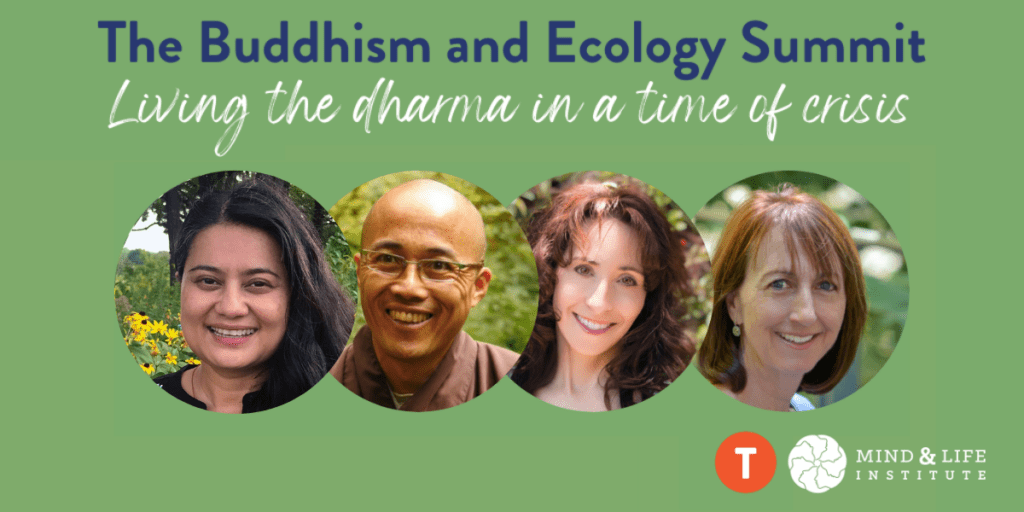
The existential threat of climate change can be challenging to grasp and confront. To stay motivated and energized to face this threat, we must develop skills and take time for our own well-being. “We have to acknowledge that what happens to us internally affects what happens to our communities,” says climate activist Dekila Chungyalpa, “and that [in turn] affects what happens to the planet. All three things are indivisible.” How can we stay present to this crisis and take part in the collective work needed to heal the human-earth connection? How can we develop resilience and navigate the difficult emotions that arise in this challenging time?
To explore these questions and more, the Mind & Life Institute and Tricycle hosted an online panel on “Connection, Community, and Compassion: Resources for our Emotional Well-being.” Alongside Dekila, the panel featured stress scientist Elissa Epel, Buddhist teacher Brother Chân Pháp Dung, and moderator Mind & Life President Susan Bauer-Wu.
More than 4,900 people from around the world tuned in to the event held in honor of Earth Day, with speakers sharing their reflections on ways we can confront the climate crisis and offering practices for emotional well-being. The panel began with a guided meditation from Brother Pháp Dung and closed with questions from the audience.
The hour-long conversation brought together scientific, contemplative, and activist perspectives, with a shared emphasis on creating the paradigm shift needed to build collective resilience. As Brother Pháp Dung said, “We need to reframe a little bit, and bring some more wonder and magic into the [climate change] movement. Although it is a crisis, as a human body and a human mind, we can only handle so much.”
Below are five takeaways from panelists on how to face the climate crisis, while caring for our emotional well-being:
- Observe your thoughts. Climate distress can lead to feelings of despair, overwhelm, and hopelessness, which can create an avoidance response. Mindful awareness helps us stay present to the challenges of our current reality, which is crucial for taking wise and timely action. Elissa cited a recent study from her work that shows practicing mindful awareness to recognize our difficult emotions about the planet decreases climate distress and avoidance.
- Come back to your body. Difficult emotions can trap us in a negative spiral of distress. Brother Pháp Dung shared a story of teaching belly-breathing techniques to an anxious young woman at an eco-retreat: “I remember being with her, breathing with her, and showing her the technique of following your breath, coming back to the body, and staying out of the mind that is like a spiral.”
- Connect with others and the Earth. Social support is a predictor of recovery from stress. Dekila recommended reviving ritual practices for connecting with ancestors, community members, and the Earth as an antidote for eco-anxiety. She shared that she avoids burnout by returning to “the unconditional love” of Mother Earth and her own “deep sense of gratitude to nature.”
- Take the action you can. Find the climate work that is the right fit for you. There is so much work to do, it can be overwhelming to start, Elissa shared. She recommended talking with friends and family about climate distress, acting locally, and remembering that our actions are contagious: “part of systemic change is trusting that we are part of social quantum change.”
- Support youth. 56% of young adults worldwide feel that humanity is doomed by climate change, according to a recent global survey. Dekila spoke to the importance of nurturing the inner resilience of youth, who are most impacted and burdened by the implications of the crisis for our planetary future. Reflecting on his experience at the 2021 UN Climate Change Conference in Glasgow (COP26), Brother Pháp Dung added that we need “the passion, the noise, the music” of youth to find new ways forward.
The panel closed with an emphasis on building community and creating connection during this challenging time, even across political and ideological divides. All people have a shared investment in the future of the planet. We need a paradigm shift to work together to heal the planet, as Dekila said, to re-imagine our current time as “an era of possibility, an era where we can live in interdependence with one another, [and] where we get to reclaim these relationships of kinship, of compassion.”
View the recording of the panel here or access the entire Buddhism and Ecology Summit on Tricycle’s website. Hear more from Elissa Epel on climate action in our January 2022 Inspiring Minds episode or learn more about Dekila Chungyalpa’s work in our May 2021 podcast episode. Both Elissa and Dekila were part of our 2021 Summer Research Institute, now available as a self-paced course on The Mind, The Human-Earth Connection, and The Climate Crisis.

